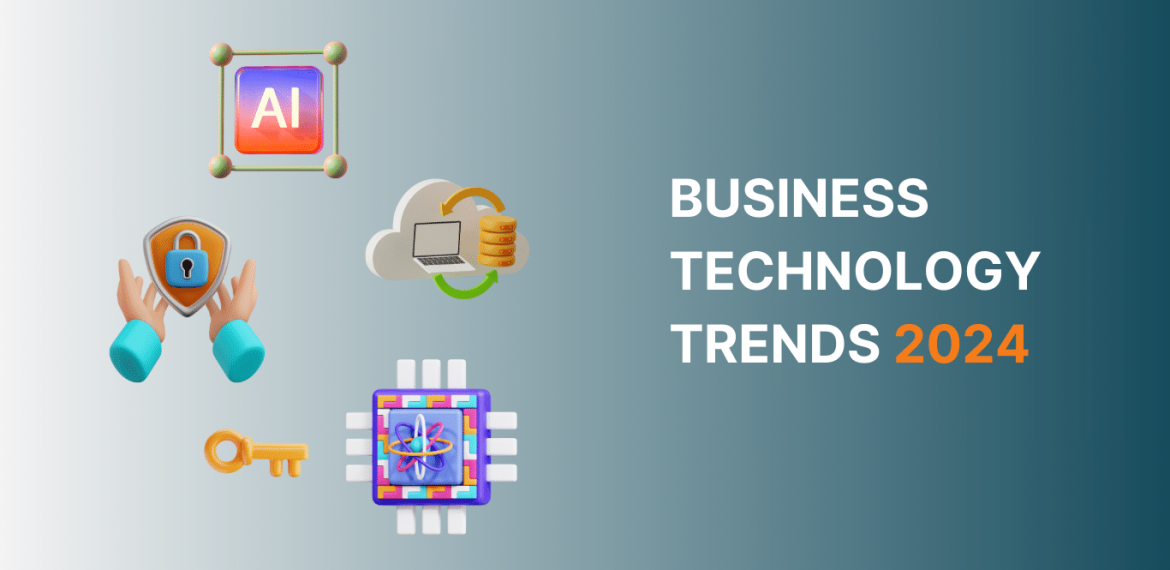
Trends in Business Technology for 2024
Trends in Business Technology for 2024
In the constantly evolving business world, staying ahead of the curve has never been more important. As technology advances at a fast pace, it is altering the basic fabric of business environment. Businesses across the UK are feeling the impact of these transformative trends.
Today, businesses are adopting modern technology in order to promote innovation, improve efficiency, and satisfy consumers’ ever-changing demands. The technology revolution is well underway, with tangible implications such as leveraging the power of artificial intelligence, strengthening cybersecurity measures, and taking advantage of cloud-based solutions.
Generative AI and Data Analytics
Generative AI has huge potential to transform data analytics in business. Businesses can use generative AI algorithms to gather important insights from massive amounts of data, allowing them to make better decisions and drive innovation. Generative AI has numerous applications in data analytics, including customer behaviour analysis, predictive maintenance, and supply chain optimisation.
Looking ahead, there are several expected innovations in the field of generative AI and data analytics that can further benefit businesses:
Enhanced Predictive Analytics
Advances in generative AI algorithms are expected to improve the accuracy and reliability of predictive analytics models. Businesses will be able to more accurately predict market trends, customer behaviour, and operational difficulties by employing more precise technologies, allowing them to make proactive decisions and stay ahead of the competition.
Explainable AI
As AI becomes more pervasive in business operations, the need for transparency and interpretability becomes crucial. Innovations in explainable AI will enable businesses to understand how AI algorithms arrive at their conclusions, enhancing trust and facilitating better decision-making.
Autonomous Data Analysis
Future advancements in generative AI could enable autonomous data analysis, where AI systems can identify relevant patterns and insights in data without human intervention. This automation will streamline decision-making processes and free up human resources for more strategic tasks.
Federated Learning
With the increasing emphasis on data privacy and security, federated learning is expected to gain prominence in data analytics. This approach allows AI models to be trained on decentralized data sources without compromising data privacy, making it ideal for industries like healthcare and finance.
Zero Trust Security Models
In a Zero Trust model, no entity, whether inside or outside the network, is automatically trusted. Every user, device, and application must undergo rigorous authentication and authorisation processes before accessing resources, regardless of their location or credentials.
Businesses across industries are increasingly adopting Zero Trust principles to safeguard their sensitive data and intellectual property. From financial institutions and healthcare providers to government agencies and multinational corporations, organisations of all sizes and sectors are recognising the importance of Zero Trust security in today’s threat landscape.
Cloud Microservices and SaaS Adoption
Cloud computing has fundamentally transformed the way businesses design, deploy, and manage their applications and services. Within this realm, two key trends—cloud microservices and Software as a Service (SaaS) adoption—are driving significant changes in the business landscape.
Cloud Microservices: Traditional monolithic systems, which have massive, tightly connected architectures, are losing way to microservices-based designs in the cloud. Microservices separate complicated applications into smaller, loosely connected services that may be created, deployed, and scaled independently.
Software as a Service (SaaS) refers to the delivery of software applications over the internet on a subscription basis, eliminating the need for on-premises installation and maintenance. SaaS offerings encompass a wide range of applications, including customer relationship management (CRM), enterprise resource planning (ERP), collaboration tools, and more.
The adoption of SaaS solutions offers numerous benefits for businesses. SaaS providers regularly release updates and patches to their applications, ensuring that businesses have access to the latest features and security enhancements without manual intervention.
Quantum Computing and Cryptography
Quantum computing is a major leap forward in computing technology, promising to handle complicated problems that are currently unsolvable for traditional computers. The purpose of cryptography is to ensure that only a trusted party with the correct key can read the data by encrypting it, or changing it from plain text to scrambled text. Quantum cryptography, by extension, encrypts and transmits data in a form that cannot be hacked. At the same time, it presents substantial problems to standard cryptographic approaches, demanding the development of new cryptographic algorithms to maintain security in the post-quantum era.
In order to get ready for quantum computers, researchers are working hard to make new cryptographic methods that cannot be compromised by quantum attacks. Post-quantum cryptography (PQC) is a group of methods that work together to keep things safe in a quantum computing setting.
PQC algorithms offer a level of security comparable to classical cryptographic methods while remaining resilient to quantum attacks. As such, they represent a critical component of future-proofing cybersecurity infrastructure against the threat posed by quantum computing.
In addition to quantum computing and cryptography, quantum networking plays a crucial role in enabling secure communication in a quantum-enabled world. Quantum communication protocols, such as quantum key distribution (QKD), leverage the principles of quantum mechanics to provide provably secure communication channels, even in the presence of a quantum adversary.
Navigating Technological Trends
Knowledgeable IT support plays a crucial role in helping businesses navigate these technological trends. Whether it’s implementing advanced security protocols, optimising cloud infrastructure, or harnessing the power of AI-driven analytics, experienced IT support teams provide invaluable guidance and support.
By staying informed and embracing technological innovation, businesses can drive growth, enhance security, and improve operational efficiency in today’s fast-paced digital economy.


